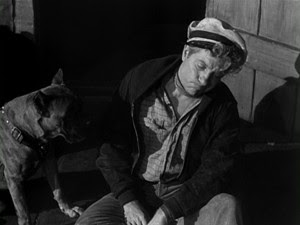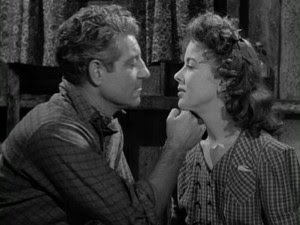This review was originally written for DVDTalk.com in 2008.
Jean Gabin was one of the earliest stars of French cinema, sort of like the Parisian Humphrey Bogart. A man's man and an extremely physical actor, he played tough guys in movies like Pepe le Moko and Port of Shadows. When I call him a physical actor, I don't mean that he was doing stunts like Erol Flynn and jumping around, but that he acted with his entire body, becoming the role in full the way Gerard Depardieu would decades later (or, for a more contemporary reference, Javier Bardem). At the same time, he also had that classic Hollywood quality where, regardless of the role he played, he was always Jean Gabin. His gestures, his way of speaking, the very way he carried himself--all Jean Gabin.
Archie Mayo's 1942 suspense picture Moontide was Gabin's first Hollywood production after emigrating stateside when the Germans rolled into France. In it, Gabin is still very much Gabin, but this time in English. He plays Bobo, a carefree dockworker in his cups on the Southern California coast. Bobo sees life as a party, and he hits the whiskey pretty heavy to keep it going. The whiskey hits back pretty hard, too, leaving the seaman with many nights unaccounted for. One in particular may need more accounting for than others: an old salt that Bobo argued with early in the evening is dead by morning, having been strangled. It seems maybe Bobo has killed with his hands before, and he may have done so again. His buddy Tiny (Thomas Mitchell) might know, but Tiny may also be keeping his lips zipped just to keep the Bobo gravy train going. It pays to harbor a man's secrets.
Things go the other way the next night, however, when Bobo sees a young woman trying to drown herself and pulls her out of the water. Anna (Ida Lupino) is a waitress with secrets of her own, and Bobo refuses to hear what drove the lady into the water, instead letting secrets remain so. Though traditionally a wanderer, Bobo decides to settle down and run a bait shop with Anna. Naturally, Tiny doesn't like seeing his ship moored, and so he tries to make trouble for the couple. It becomes a game of who knows what, who is bluffing, and who will call those bluffs.
For his American debut, Gabin surrounds himself with a marvelous ensemble of actors, and he more than holds his own. Bobo is a character who takes whatever comes how it comes, and Gabin lets his body hang loose for the role, saying just as much with his graceful and comic hand gestures as he does through dialogue. He's excellent with Lupino, whose frail demeanor is perfect for the world-weary Anna. She goes from tentative to increasingly confident in Bobo's care, even eventually mustering the strength to stand up to Tiny. As the bad guy, Thomas Mitchell almost owns the whole show. The character actor is probably best known as Uncle Billy in It's A Wonderful Life [review] and the Mayor in High Noon [review], far cheerier roles than this one, and it's actually a shame he didn't get to be the heavy more often. Tiny is a real bottom-feeding weasel, the kind of guy you love to hate and whose mere presence adds tension to a scene. If you said that they didn't have to cue Bobo's dog to growl at him every time he came near, he just got testy because Mitchell made the canine believe he really was a lout, I'd not doubt it. He also brings an intriguingly obsessive edge to the role that lends some fire to the homoerotic undertones in the Tiny/Bobo relationship. Being gay would certainly explain why Bobo keeps taking off to go fishing or work on an engine rather than spend the night with his woman, which otherwise just looks like a clumsy device to clear the way for Tiny to victimize Anna.
Of the strong cast, only Claude Rains (Casablanca) seems to be playing under his usual caliber. Perhaps it's just the nature of his role, though. The character of Nutsy is more of an observer who occasionally doles out some barroom wisdom rather than being a completely active participant in the melodrama. That particular role certainly isn't the only thing undercooked in Moontide. Despite having such amazing actors and a narrative gumbo that practically demands Mayo pour on the spice, Moontide is a pot that never boils. The entire picture moves at an even pace, never speeding up to match the bloodlust or slowing down to enjoy any other kind. The direction is workmanlike, only mustering up any semblance of a style in a few of the late-night shots and one amazing, Dali-inspired drunken montage. Then again, how hard is it to get a dramatic image by backlighting an actor on a foggy coastline? Plus, we don't know how much of that was really Fritz Lang, who left the movie after two weeks of shooting, making room for Mayo.
Moontide is neither dark enough for a noir, nor histrionic enough to be a truly effective melodrama. The seas should rage, but instead, the waves roll in calmly with barely enough force to push a dead body ashore. Not a terrible movie, but not all that memorable either--just disappointing.












